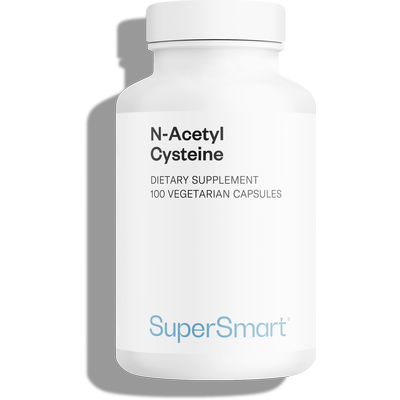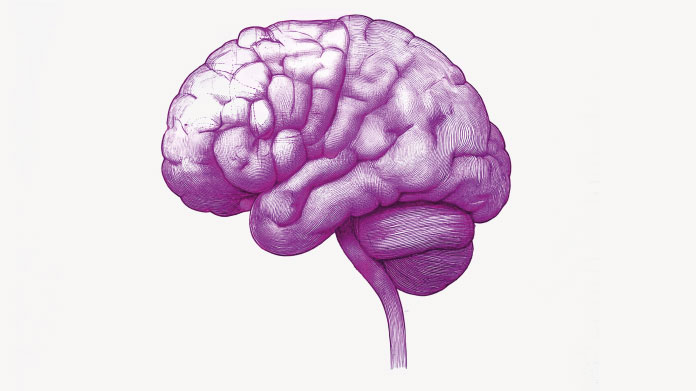N-acetylcysteine (NAC): useful against mood disorders?
Could a derivative amino acid have an influence on our mood, our motivation or even our morale? Several recent studies suggest a promising link... to be explored without delay.

N-acetylcysteine: a stable cysteine derivative
N-acetylcysteine, or NAC, is a stable, synthetic form of cysteine, a non-essential sulphur-containing amino acid that the body can produce from food.
Cysteine plays a crucial role in the synthesis of glutathione, one of the most powerful natural antioxidants produced by the human body, essential for cellular detoxification and protection against oxidative stress.
The 'N-acetylated' form has been developed to improve the chemical stability, solubility and oral bioavailability of cysteine, making it easier to assimilate.
Once in the body, NAC is easily converted into cysteine. This supports the endogenous production of glutathione and enables the body to benefit from its protective effects.
Current research is exploring the various potential effects of NAC in the body, particularly its impact on mood.
NAC and glutathione: their effects on the body
As a precursor of glutathione, N-acetylcysteine is being studied for its role in antioxidant defence, the reduction of oxidative stress and cellular detoxification (1).
A powerful endogenous antioxidant, glutathione is involved in neutralising free radicals, helping the liver to function properly and protecting cells.
More widely, NAC is also known for its mucolytic properties (liquefying bronchial secretions), which explains its traditional use in respiratory medicine (2).
It is also being studied in various other medical fields, notably for its potential protective effect on brain cells and inflammatory pathways (3-4).
As a result, it is now found in the form of dietary supplements, often aimed at supporting vitality, the immune system or oxidative balance.
![]() Discover N-Acetyl Cysteine, a supplement with a high dose of NAC to support glutathione production and protect against oxidative stress.
Discover N-Acetyl Cysteine, a supplement with a high dose of NAC to support glutathione production and protect against oxidative stress.
NAC and mood disorders: what recent research reveals
While N-acetylcysteine is best known for its role in glutathione synthesis, several recent studies suggest that it may help regulate certain biological mechanisms involved in mood disorders.
Studies looking at low mood, mental fatigue and emotional instability
In recent years, N-acetylcysteine (NAC) has attracted growing interest in mental health research, particularly for its potential role in supporting emotional balance.
Several clinical studies have explored its effects in a variety of contexts, including mild to moderate depression, persistent anxiety and certain states of chronic discouragement, mental fatigue or emotional instability.
A study published in 2023 in Clinical Psychopharmacology and Neuroscience (5) assessed the effects of 2000 mg/day N-acetylcysteine supplementation for 12 weeks in adults suffering from major depression.
Although no significant improvement was observed at 12 weeks, notable benefits were seen at 16 weeks, including improvements in mood, optimism, social relationships and the ability to function daily.
These results suggest that NAC could offer useful progressive support that complements traditional approaches, particularly in a medium-term strategy for emotional rebalancing.
Potential action on several mechanisms linked to emotional balance
Another study published in 2024 in General Hospital Psychiatry (6) looked at the effects of NAC supplementation on mood disorders.
This meta-analysis compiled data from 12 randomised controlled trials, involving a total of 904 participants suffering from mood disorders (particularly depressive episodes). The doses of N-acetylcysteine (NAC) ranged from 1,000 to 3,000 mg/day, over a period of 8 to 24 weeks.
Result: compared with placebo, NAC was significantly associated with a reduction in depressive symptoms, with a standardised mean difference of -0.24 (indicating a modest but real effect).
The authors conclude that NAC could be an interesting complementary option for improving emotional state, particularly as a support to conventional treatment.
Although this work remains exploratory, several plausible biological mechanisms have been put forward to explain these results:
- support for glutathione production, which reduces oxidative stress, a factor often associated with mood disorders (7);
- modulation of neurotransmission systems, particularly glutamate, imbalances of which are frequently observed in depressive states (8);
- an indirect anti-inflammatory effect, through the regulation of certain pro-inflammatory cytokines that could affect brain function (9);
- a regulating effect, which could support emotional well-being.
Unlike certain supplements or substances that act directly on brain chemistry, N-acetylcysteine produces neither a stimulating nor a euphoric effect.
Instead, it may have a more subtle, underlying effect, helping to restore a certain overall balance.
Recent research suggests that NAC supports emotional resilience, particularly in people experiencing mental fatigue, withdrawal, reduced motivation or chronic fatigue.
The scientists point out that NAC is not a substitute for medical treatment in the case of a proven disorder.
However, it could be an interesting complementary support when integrated into a more holistic approach to well-being. It may be particularly relevant for adults aged 40 and over, who are more exposed to oxidative stress and age-related neurochemical imbalances.
In this context, NAC is a gentle but potentially valuable form of support, best used alongside a balanced diet, good sleep, regular physical activity and effective stress management tools.
![]() Discover N-Acetyl Cysteine, a stable, well-tolerated supplement which supports glutathione synthesis, studied in the context of oxidative stress and emotional balance.
Discover N-Acetyl Cysteine, a stable, well-tolerated supplement which supports glutathione synthesis, studied in the context of oxidative stress and emotional balance.
SUPERSMART ADVICE
References
- Raghu G, Berk M, Campochiaro PA, Jaeschke H, Marenzi G, Richeldi L, Wen FQ, Nicoletti F, Calverley PMA. The Multifaceted Therapeutic Role of N-Acetylcysteine (NAC) in Disorders Characterized by Oxidative Stress. Curr Neuropharmacol. 2021;19(8):1202-1224. doi: 10.2174/1570159X19666201230144109. PMID: 33380301; PMCID: PMC8719286.
- Holdiness MR. Clinical pharmacokinetics of N-acetylcysteine. Clin Pharmacokinet. 1991 Feb;20(2):123-34. doi: 10.2165/00003088-199120020-00004. PMID: 2029805.
- Kumar P, Liu C, Suliburk J, Hsu JW, Muthupillai R, Jahoor F, Minard CG, Taffet GE, Sekhar RV. Supplementing Glycine and N-Acetylcysteine (GlyNAC) in Older Adults Improves Glutathione Deficiency, Oxidative Stress, Mitochondrial Dysfunction, Inflammation, Physical Function, and Aging Hallmarks: A Randomized Clinical Trial. J Gerontol A Biol Sci Med Sci. 2023 Jan 26;78(1):75-89. doi: 10.1093/gerona/glac135. PMID: 35975308; PMCID: PMC9879756.
- Clark RSB, Empey PE, Kochanek PM, Bell MJ. N-Acetylcysteine and Probenecid Adjuvant Therapy for Traumatic Brain Injury. Neurotherapeutics. 2023 Oct;20(6):1529-1537. doi: 10.1007/s13311-023-01422-z. Epub 2023 Aug 18. PMID: 37596428; PMCID: PMC10684451.
- Russell SE, Skvarc DR, Mohebbi M, Camfield D, Byrne LK, Turner A, Ashton MM, Berk M, Dodd S, Malhi GS, Cotton SM, Bush AI, Dean OM. The Impact of N-acetylcysteine on Major Depression: Qualitative Observation and Mixed Methods Analysis of Participant Change during a 12-week Randomised Controlled Trial. Clin Psychopharmacol Neurosci. 2023 May 30;21(2):320-331. doi: 10.9758/cpn.2023.21.2.320. PMID: 37119225; PMCID: PMC10157003.
- Tzu-Rong Peng, Hung-Hong Lin, Tzu-Ling Tseng, Yun-Hui Huang, Pei-Yun Tsai, Chia-Yu Lin, Ming-Chia Lee, Shih-Ming Chen, Efficacy of N-acetylcysteine for patients with depression: An updated systematic review and meta-analysis, General Hospital Psychiatry, Volume 91, 2024, Pages 151-159, ISSN 0163-8343
- Bhatt S, Nagappa AN, Patil CR. Role of oxidative stress in depression. Drug Discov Today. 2020 Jul;25(7):1270-1276. doi: 10.1016/j.drudis.2020.05.001. Epub 2020 May 8. PMID: 32404275.
- Duman RS, Sanacora G, Krystal JH. Altered Connectivity in Depression: GABA and Glutamate Neurotransmitter Deficits and Reversal by Novel Treatments. Neuron. 2019 Apr 3;102(1):75-90. doi: 10.1016/j.neuron.2019.03.013. PMID: 30946828; PMCID: PMC6450409.
- Kronfol Z, Remick DG. Cytokines and the brain: implications for clinical psychiatry. Am J Psychiatry. 2000 May;157(5):683-94. doi: 10.1176/appi.ajp.157.5.683. PMID: 10784457.
Keywords
1 Days
Trustworthy company with tested products
Trustworthy company with tested products
Trusted
5 Days
Efficiency and speed
Efficiency and speed
Cuccie
7 Days
GOOD BRAND IN FOOD COMPLEMENTS
GOOD BRAND IN FOOD COMPLEMENTS - SERIOUS WITH GOOD DOCUMENTS AND DETAILS SCIENTIST. AND SERIOUS HONNEST COMMERZIALISATION. I HAVE TRUST IN THEIR PRODUCTS.
FENOGLIO Guy
9 Days
Very good experience
Very good experience, the products arrived in time, in perfect condition and are good quality. Thank you.
GABI TIRCOCI
14 Days
very good expereince
very good expereince
Jelena Đaković
14 Days
Very good products.
Very good products.
Agnes BENDSAK
17 Days
Just OK
Just OK, ordering from company for many years and being safisfied
Lynn Mae
17 Days
Recomendo
Produtos encomendados são recebidos atempadamente e de acordo com o anunciado! Muito satisfeita!
Carla Sofia
18 Days
Everything is great!
Everything is great!
Jonas
23 Days
The delivery was fast and the product…
The delivery was fast and the product is great
SOMMARIVA Gianni
24 Days
Great service and lots of information
Great service and lots of information
Gabi
27 Days
Service Satisfaction
I’m satisfied with the service; it fulfilled what it set out to do.
Anfhony Abreu
30 Days
Original product and fast delivery
Original product and fast delivery. I haven't started it yet, but will do soon.
Vincenza Catania
32 Days
Good quality
Good quality. Good service.
Leonel Guzman
34 Days
Top!!!!!!!!
Top!!!!!!!!
Michael
of experience
your money back
##montant## purchase





